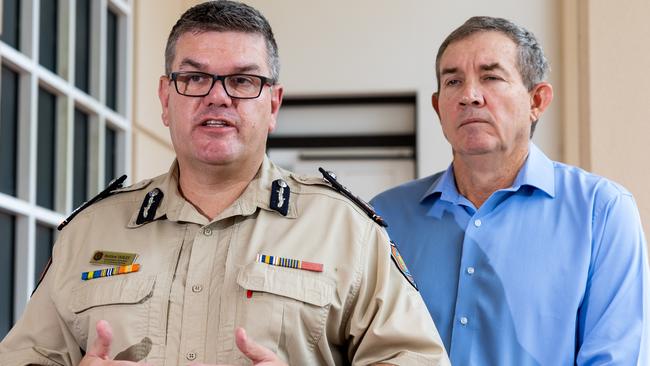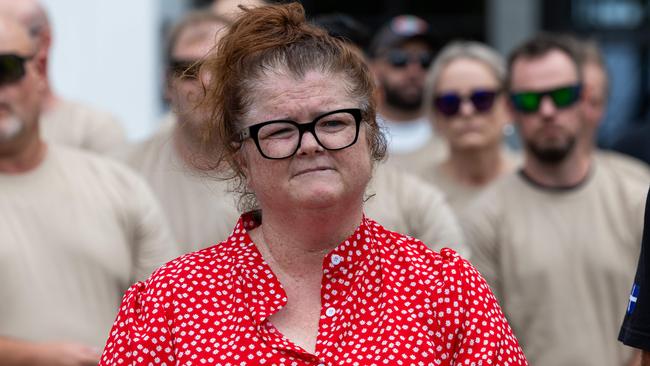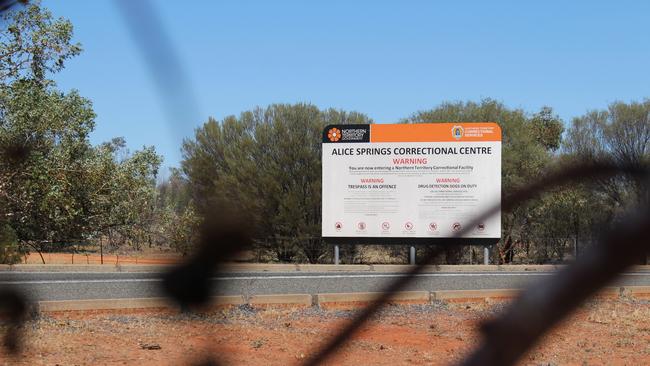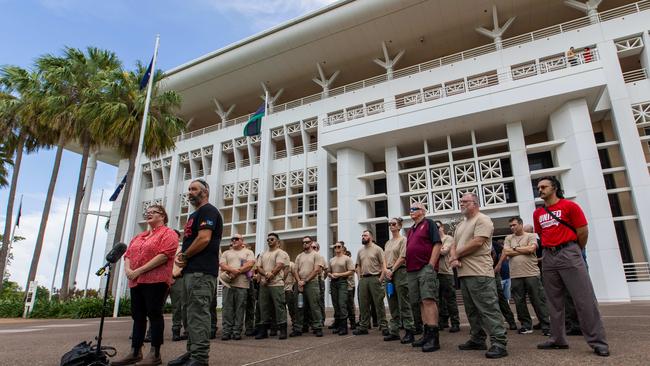Matthew Varley doubles down on corrections upgrades as unions see red
The enormous surge in prisoner numbers is delivering massive challenges for Corrections staff and management. Read the numbers behind the human tragedy.
Business
Don't miss out on the headlines from Business. Followed categories will be added to My News.
More than ever as he heads into his fourth year leading the Territory corrections system, Commissioner and chief executive Matthew Varley is doing the numbers.
And there’s plenty to count as he rolls out the biggest Corrections infrastructure build since Holtze prison opened in 2014.
On any given day the Territory’s corrections population sits around 2700. When he accepted the job in 2022, there were around 1950 to 1970 in jails, and the department was “getting stressed” about breaching the 2000 mark.
Of those, about 85 per cent are Aboriginal prisoners, 60 per cent had been there within the previous two years and about 55 per cent of prisoners are on remand.
Today’s number sits at about 500 more prisoners than August last year.
The prisons population was about 2250-2300 when the new government’s corrections infrastructure masterplan was being developed back in September, ahead of its October launch, with a “long-term eye” on topping 3000 over four years.
It could hit that mark within 12 months – and still the numbers continue.
Berrimah prison, which is temporarily being restored to hold adults again, was intended for a maximum of 200 inmates. Sitting at 164 today, the refurbishment is now targeting between 300-400 new inmates within the next few months.
The system employs 722 correctional uniformed officers, 195 community corrections staff, 73 offender and rehabilitation staff as well as youth justice officers, clinical rehabilitation psychologists, social workers and educators, totalling about 1352 correctional workers.
Between July 2024 and January, Corrections had recruited 30 experienced officers and 73 new recruits, 31 of whom are training, meaning an additional 103 new uniformed officers over seven months.
The retention rate for officers is about 10-11 per cent. Darwin Correctional Centre held 1436 prisoners on Friday and Alice Springs Correctional Centre has hit its 730 capacity. Before the August Territory election the prison population was 2200.

The 500 additional prisoners number factors in prisoner turnover, meaning the number is actually lower than the intake because discharges are also counted.
Commissioner Varley estimated another 100 uniformed Correctional Officers would still leave the system short and that every day officers are taken away from prisons on a range of related duties, including prisoner accompaniments to courts, Katherine collections, video link hearings, hospital, clinical or specialist appointments.
There are five officers, for example, at Darwin Watch House during the day, four at night and seven officers at Palmerston.
A consequence of staff shortages is the service has had to cancel about 50 per cent of family violence treatment programs, education programs are running at 50 per cent capacity, non-essential industries and community service work parties have been shut down and 74 per cent of psycho-educational programs in Darwin Correctional Centre were cancelled.
In 2020 – 2021 the average prisoner to staff ratio across the NT was 3.17
prisoners for every uniformed member of staff. In December 2024 – it is 4.03 prisoners for every uniformed staff member.
Additionally, the overtime bill for corrections staff was $21m.

The data dump came during an interview with the NT News on Friday, where the Corrections Commissioner prosecuted his case to bring in private contractors to fill largely non-custodial roles, assisting with prisoner transport, escorts to jails, health and hospital appointments, electronic monitoring and compliance activities.
He summed the current corrections situation in a single sentence.
“This increased pressure and workforce shortages is killing us.”
The move towards non-union recruits angered United Workers Union, which represents corrections officers, who said Thursday’s carriage through NT parliament of the Correctional Services Legislative Amendment Bill 2025 “was a sad day for correctional officers”.
UWU secretary Erina Early said officers were “anxious and furious” at opening the system up to private labor hire and that trained correctional officer roles could be opened up to unqualified people.
About 40 officers attended this week’s Parliamentary sittings to make their opposition to the government’s amendments clear, and there is talk of a no-confidence motion in the Commissioner. Ms Early also warned the legislation was a precursor to the full privatisation of the NT’s Corrections system.
While he said nobody could guarantee what a future government or Commissioner might decide based on the legislation, Varley pointed to interstate precedent with governments in Victoria, South Australia and Western Australia having delivered ancillary services through private providers for years.
“I live, breathe and sleep prison numbers,” he said. “That’s the first thing I do when I wake up in the morning and it’s probably one of the last things I talk about at night before I go to sleep,” he said.
“So the math’s for me is common sense. The impact is not just the security and safety of our staff, which is number one, but it’s also the services we have to deliver for those prisoners when they’re in custody.
“Video links, lawyers have got to see their client. Families want to come and visit, kids come and visit dad. We’re supposed to deliver rehabilitation programs and I have treatment programs for family violence and alcohol and drugs.
“Why not use specialist expertise to support us to do our job better, the same way we do in the health system or the education system?”.

“The changes are not about saying to my officers that the jobs they do are not important. It’s about saying ‘how do we get you doing the jobs that you do best, which is running the prisons and getting those prisons functioning again so we can start to deliver all these services’.
“Everyone’s working lots of overtime, extras shifts, on their days off and that’s okay, and you can’t do it forever.”
The government is currently advertising for a Corrections infrastructure tsar to oversight the extensive works program that the Opposition Labor Party estimate could cost not much short of $1bn.
As well as the temporary restoration of Berrimah prison, the masterplan will see the Alice Springs youth detention facility repurposed into a women’s prison, opening up an additional 130 male prisoner beds at the Alice Springs Correctional Centre.
A new 150-bed women’s prison at Holtze has also been planned, with construction to be completed by September 2028 as well as new work camps in Holtze and Katherine.

With the repurposed Berrimah only expected to operate for two years, the infrastructure boss will be tasked with achieving the impossible – completing an NTG program on time and on budget.
“A bad example was the 96-bed Alice Springs modular facility,” he said, of the so-called O Block additions to Alice Springs Correctional Centre, due for completion mid last year. “That was a project we started a bit over two years go. It's taken far longer than it should have and that I would have liked.” It’s now expected to be opened by the end of the month.
“Alice Springs is under extraordinary staffing pressure, as everyone knows, and that’s why this change program is so important.
“If we can bring staffing relief to things like escorts and hospitals and courts, then those officers can be in those new blocks running those prison population increases, and the same applies in Darwin.”
The new facility is expected to open next month, but delays in completion highlighted the need for an effective, coherent works program.
“Berrimah has a time-limited window (and) all of those other pieces of the puzzle, the new women’s facilities, the new work camps and the expansions out in Holtze have got to be done in parallel so that I can get out of the Berrimah facility in a couple of years time,” he said.
“There’s timelines that are very tight, and the government will hold us to those very tight timelines.”





